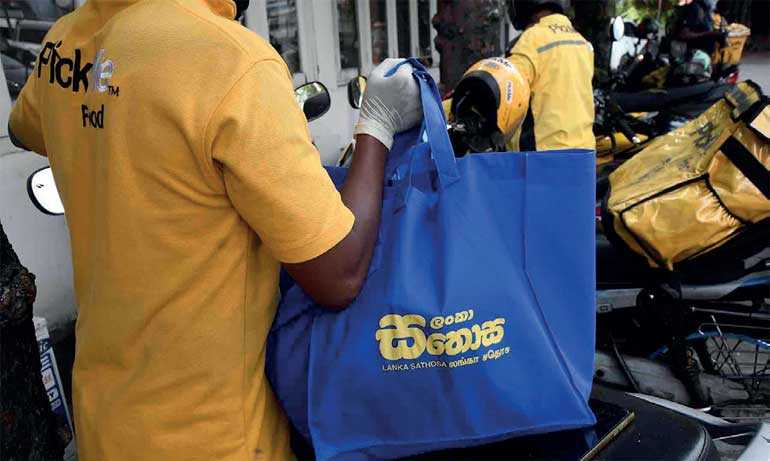Tuesday Feb 17, 2026
Tuesday Feb 17, 2026
Wednesday, 8 April 2020 01:04 - - {{hitsCtrl.values.hits}}

Collaboration is the key disaster management and there is a need for a synergetic approach in this context. The collaboration between Sathosa and PickMe can be considered as one of the models we can study – Pic by Shehan Gunasekara
COVID-19 has already started to test everything! Even the creativity and innovativeness of businesses is already coming under this testing category. We all are in the learning curve at the moment and it is important to learn from some success stories. 
Now we can see many leading supermarkets and online stores in Sri Lanka struggling to meet the online demand of customers. Some hotlines are not working and many customers find it difficult to get their products delivered. On the other hand, people have started to realise the importance of their neighbourhood boutique as I think it is one of the messages sent by COVID-19.
Interestingly in China you can observe a good practice of reallocating labour flexibly to different activities.
“Some creative Chinese enterprises actively reallocated employees to new and valuable activities, like recovery planning, or even loaned them to other companies. For example, in response to a severe decline in revenue, more than 40 restaurants, hotels, and cinema chains optimized their staffing to free up a large share of their workforces. They then shared those employees with Hema, a ‘new retail’ supermarket chain owned by Alibaba, which was in urgent need of labour for delivery services due to the sudden increase in online purchases. O2O players, including Ele, Meituan, and JD’s 7Fresh followed this lead by also borrowing labour from restaurants” – How Chinese companies have responded to coronavirus, https://hbr.org/2020/03/how-chinese-companies-have-responded-to-coronavirus.
Collaboration is the key disaster management and there is a need for a synergetic approach in this context. The collaboration between Sathosa and PickMe also can be considered as one of the models we can study.
There is a need for redeployed sales efforts to new channels both in Business to Consumer (B2C) and Business to Business (B2B) enterprises. Refer below for one example.
“Cosmetics company Lin Qingxuan was forced to close 40% of its stores during the crisis, including all of its locations in Wuhan. However, the company redeployed its 100+ beauty advisors from those stores to become online influencers who leveraged digital tools, such as WeChat, to engage customers virtually and drive online sales. As a result, its sales in Wuhan achieved 200% growth compared to the prior year’s sales” – https://hbr.org/2020/03/how-chinese-companies-have-responded-to-coronavirus.
Around the world you can observe the increase in hiring staff in delivery to meet customer demand. Amazon is hiring 100,000 workers and increasing wages from $15 per hour to $17 per hour. Domino’s Pizza wants to hire 10,000 employees to help delivery operations, and Walmart plans to add 150,000 new workers (www.forbes.com).
Below is the observation of Michael DiBenedetto, CEO and founder of FoodBoss, on partnerships with some apps on online delivery.
“I genuinely believe everyone is focused on the current situation, and how we can all help. With that being said, some of the aid delivery services are offering by waiving restaurant fees is likely to result in delivery service expanding as new restaurants come on board. To maintain the partnerships built with restaurants, apps will likely have to accommodate some extension of reduced fees as the demand subsides” – https://www.forbes.com/sites/lanabandoim/2020/03/20/how-food-delivery-apps-are-responding-to-the-coronavirus/#71c0c22e55dc.
In this context you can see some incremental as well as drastic changes in world business landscape. It is clear that there is a need to have better partnerships and collaboration with innovation. A strategic window has opened for Sri Lanka and businesses and we should grab the opportunity in this. We should learn the best practices and proactively think about the future.
“Changes call for innovation, and innovation leads to progress” – Li Keqiang.
(The writer is Professor in Management Studies at the Open University of Sri Lanka. You can reach him via [email protected].)